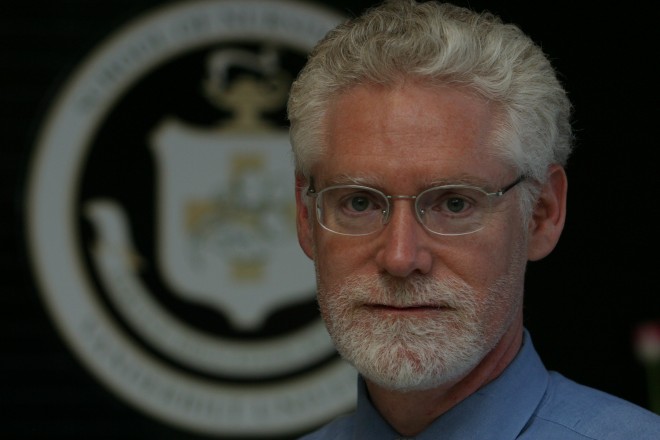 When Peter Buerhaus graduated from Minnesota State Mankato in 1976, his plan was to use nursing as his ticket to travel the world. He figured he’d work long enough to fund his first flight, then go abroad, working as a nurse wherever he was able. “See the world,” he says. “That was my plan.”
When Peter Buerhaus graduated from Minnesota State Mankato in 1976, his plan was to use nursing as his ticket to travel the world. He figured he’d work long enough to fund his first flight, then go abroad, working as a nurse wherever he was able. “See the world,” he says. “That was my plan.”
He only made it as far as Ohio.
That’s where he fell in love, got married and started graduate school. That’s where he was introduced to the connection between economics and nursing, where he saw the value of results culled from a well-planned research study, where he realized the influence those results could have on policy makers. And that’s where his career path veered away from clinical practice and into a more academic vein. “I never saw it coming,” he admits.
Now, Buerhaus is the Valere Potter Professor of Nursing and the director of the Center for Interdisciplinary Health Workforce Studies at the Institute for Medicine and Public Health at Vanderbilt University Medical Center. He’s a recognized expert on issues relating to the nursing workforce, which is why today called him to discuss what the Affordable Care Act means to nurses.
TODAY: How do you think the Affordable Care Act impact the nursing workforce?
Peter Buerhaus: I should start with the big picture. We have had decades with big developments that, in my view, were mostly directed at hospitals, physicians, managed care, Medicare and Medicaid. Now, reform is about the whole system: improving the delivery of care, embracing prevention, expanding health insurance coverage, and finally, reforming the way we pay for health care. The nursing profession stands to gain in each of those four areas.
TODAY: How so?
PB: What nurses need to do is ask, “How do I add value to all of these elements of reform?” … Nurses need to step up and look at their ability to provide value. That means taking a self-examination of the things they do every day and deciding which add value, and which do not. This system is going to be rewarding the things that add value.
TODAY: Why should nurses be part of the conversation about health care reform?
PB: The answer is twofold. First, they are the most trusted, most admired and most respected profession in the country, bar none. The people who are interested in moving forward with healthcare reform should recognize that it makes sense to work with them as they move forward. And second, nurses already provide a lot of value to the system. If we can tweak nursing in ways that are helpful to supporting the changes, then you are using an existing resource to make things better, rather than creating something new.
TODAY: How can universities like Minnesota State Mankato prepare nurses who are ready for what may be a very different health-care system?
PB: Right now, we focus on a clinical model of patient care, with our clinicals in the hospital. But the care delivery system is saying “see you later” to hospitals. Curriculum has to get in line with where the health care system is going. And then the state licensing exams have got to get in line, too; if the state licensing exam isn’t asking questions about prevention, delivery reform, access and value, then the faculty won’t be teaching it.
TODAY: How did Minnesota State Mankato have an impact on your career?
PB: I had great clinical and classroom instructors; I was challenged and I was inspired to learn. I also had exceptional classmates who helped me grow a lot as a human being. Another thing that was very important: We had a curriculum that emphasized theory, in terms of why you do what you do, and how it has an impact on the health of the patient, the family and the community. But it was backed up by experiential learning, particularly in terms of communication and working well in groups. It was visionary. I had a tremendously positive experience in Mankato.
Speak Your Mind